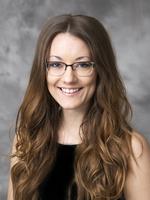Purdue grad student earns prestigious NSF fellowship
Reppa has been selected as a National Science Foundation (NSF) Fellow in the NSF Graduate Research Fellowship Program. She will receive an annual stipend, cost of education allowance, and opportunities for international research and professional development, and the freedom to conduct her own research for three years.
She is now working with Dr. Joe Sinfield, Associate Professor of Civil Engineering and Director of the College of Engineering Innovation and Leadership Studies Program, in Purdue's Enabling Innovation Laboratory. Sinfield, Reppa said, "inspired me to apply innovation science to the complex problems I was addressing."
Her work is focused on the science of enacting positive change to resolve grand challenges. Some of those challenges include providing access to clean water around the globe, managing the nitrogen cycle, securing cyberspace, reverse-engineering the brain, making solar energy economical, and enhancing virtual reality.
"Resolving them requires a collaborative, interdisciplinary approach," Reppa said. "By fusing innovation science, social and cognitive psychology, and engineering, I am developing novel tools and frameworks to manage the rapid changes we will see in the 21st century."
"These are dimensions not often pursued in a truly integrated way" said Sinfield. "Kim's work is really bringing together engineering, sociology, and psychology and taking a holistic view of the issues."
Reppa, who also is working as an undergraduate course instructor and teaching assistant, plans to use the skills she has gleaned from Sinfield's Innovation and Leadership program to "take a different, more socially relevant and equitable approach to problems that can too often be viewed as strictly technical."
The work is incredibly ambitious. "Currently, the majority of engineering solutions to grand challenges fail, particularly those implemented in the developing world," Reppa explained. But she is likely up to the task. As an undergraduate, she performed five co-op sessions at NASA Johnson Space Center in Houston, Texas. Her mentors there spurred her on to address issues like designing low-cost sustainability programs. While working full-time at NASA, she served as a part-time Program Coordinator for the City of Houston's Mayor's Office of Sustainability and addressed the lack of potable water in the rural Dominican Republic with faculty at Purdue.
"I have always been universally interested in the arts, humanities, and sciences. My work is a lifelong rebellion against the status quo concept that intellectual merit is measured by our willingness to conform to the rules and norms of a single discipline," Reppa said, adding that she is committed to a career that will allow her to apply compassion and concern for others.
The fellowship, she said, will allow her to devote more attention to her academic work. "I am very excited that the NSF endorses my vision and am deeply grateful for their belief and support."

